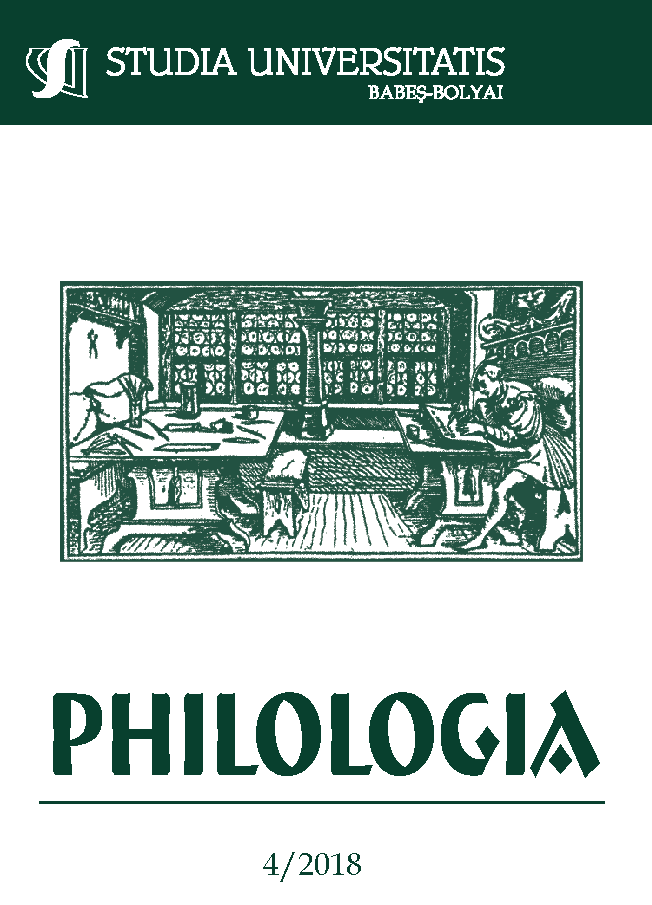SHIFTING PERSPECTIVES: LEOPOLD BLOOM, HOSPITALITY, AND THE OTHER IN JAMES JOYCE’S “ULYSSES”
DOI:
https://doi.org/10.24193/subbphilo.2018.4.14Keywords:
Leopold Bloom, perspective, hospitality, love, ethics of alterity, Levinas, Derrida.Abstract
Shifting Perspectives: Leopold Bloom, Hospitality, and the other in James Joyce’s “Ulysses”. The present paper interprets the character of Leopold Bloom in light of his incorporation of the ethical necessity to “see ourselves as others see us”, as well as the meaning acquired by the character when read against the context of the Great War. We propose that Bloom the redeemer, as he is portrayed on several occasions throughout the day, is not a single Messianic figure, but rather a type of human being with a distinctive attitude to the experience of the Other. The protagonist, himself an exile, is perpetually prone to shed his own point of view in favour of that of alterity, in other words, to see the world as others might see it. His acts of kindness, his generous, gentle nature, and his interactions with Stephen and Molly can all be viewed, as I will argue, as consequences of this almost in-built shift of perspective.
Rezumat. Schimb de Perspectivă: Despre Leopold Bloom, Ospitalitate și Alteritate în “Ulise”. Lucrarea de față propune o interpretare a personajului Leopold Bloom plecând de la felul în care acesta reiterează versul lui Robert Burns, „să ne vedem cum ne văd alții,” și având în vedere faptul că James Joyce scrie Ulise în timpul primului război mondial. În acest sens, Bloom salvatorul, așa cum el este descris pe parcursul romanului, nu este propriu-zis o figură mesianică, ci, mai degrabă, exponentul unei tipologii umane cu a atitudine deosebită față de experiența alterității. El însuși exilat din orice comunitate, protagonistul tinde întotdeauna să renunțe la propriul punct de vedere în favoarea Celuilalt. Cu alte cuvinte, Bloom vede lumea așa cum o văd alții.
Cuvinte cheie: Leopold Bloom, perspectivă, ospitalitate, iubire, etica alterității, Levinas, Derrida.
References
Joyce, James. 1986. Ulysses. Edited by Hans Walter Gabler, Steppe Wolfhard and Melchior Claus. Vintage Books.
Derrida, Jacques. 1999. “A Word of Welcome.” Adieu to Emmanuel Levinas, translated by Pascale-Anne Brault and Michael Naas. Stanford University Press.
Derrida, Jacques. 2000. Of Hospitality: Anne Dufourmantelle invites Jacques Derrida to respond. Translated by Rachel Bowlby. Stanford University Press.
Derrida, Jacques. 1997. Politics of Friendship. Translated by George Collins. Verso.
Derrida, Jacques. 1992. “Force of Law: The Mystical Foundation of Authority.” Deconstruction and the Possibility of Justice, edited by Drucilla Cornell, Michael Rosenfeld, and David Gray Carlson. Routledge, 3-67.
Derrida, Jacques. 2013. “The Animal That Therefore I Am (More to Follow).” Signature Derrida, edited by Jay Williams. The University of Chicago Press, pp. 380-435.
Derrida, Jacques. 1992. The Other Heading. Translated by Pascale-Anne Brault and Michael Naas. Indiana University Press.
Hammerschlag, Sarah. 2016. Broken Tablets: Levinas, Derrida, and the Literary Afterlife of Religion. Columbia University Press.
Kakoliris, Gerasimos. 2015. “Jacques Derrida on the Ethics of Hospitality.” The Ethics of Subjectivity: Perspectives since the Dawn of Modernity. Edited by Elvis Imafidon. Palgrave Macmillan.
Kiberd, Declan. 2009. Ulysses and Us: The Art of Everyday Living. Faber and Faber.
Lawlor, Leonard. 2014. “Deconstruction.” A Companion to Derrida, edited by Zeynep Direk and Leonard Lawlor. Wiley Blackwell, pp. 122-31.
Levinas, Emmanuel. 2001. Is It Righteous to Be?: Interviews with Emmanuel Levinas. Edited by Jill Robbins. Stanford University Press.
Levinas, Emmanuel. 1987. “Freedom and Command.” Collected Philosophical Papers. Translated by Alphonso Lingis. Martinus Njhoff Publishers.
Levinas, Emmanuel. 1991. Otherwise than Being or Beyond Essence. Translated by Alphonso Lingis. Kluwer Academic Publishers.
Levinas, Emmanuel. 1979. Totality and Infinity. Translated by Alphonso Lingis. Martinus Nijhoff Publishers.
Moati, Raoul. 2017. Levinas and the Night of Being: A Guide to Totality and Infinity. Translated by Daniel Wyche. Fordham University Press.
Morgan, Michael. 2011. The Cambridge Introduction to Emmanuel Levinas. Cambridge University Press.
Raffoul, François. 2014. “Heidegger and Derrida on Responsibility.” A Companion to Derrida, edited by Zeynep Direk and Leonard Lawlor. Wiley Blackwell, 412-29.
Secomb, Linnell. 2007. Philosophy and Love from Plato to Popular Culture. Edinburgh University Press.
Utell, Janine. 2010. James Joyce and the Revolt of Love: Marriage, Adultery, Desire. Palgrave Macmillan.
Downloads
Published
How to Cite
Issue
Section
License
Copyright (c) 2018 Studia Universitatis Babeș-Bolyai Philologia

This work is licensed under a Creative Commons Attribution-NonCommercial-NoDerivatives 4.0 International License.





 ©Studia Universitatis Babeş-Bolyai Philologia. Published by Babeș-Bolyai University.
©Studia Universitatis Babeş-Bolyai Philologia. Published by Babeș-Bolyai University.